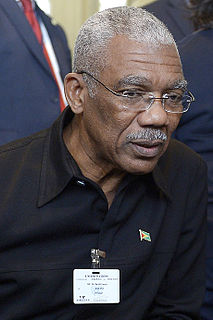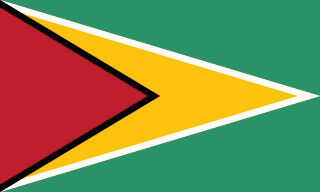
Bharrat Jagdeo is a Guyanese politician who was President of Guyana from 11 August 1999 to 3 December 2011. He holds a number of global leadership positions in the areas of sustainable development, green growth and climate change.

Samuel Archibald Anthony Hinds is a Guyanese politician who was Prime Minister of Guyana almost continuously from 1992 to 2015. He also briefly served as President of Guyana in 1997. He was awarded Guyana's highest national award, the Order of Excellence (O.E.) in 2011.

The President of the Co-operative Republic of Guyana is the head of state and the head of government of Guyana, as well as the commander-in-chief of the armed forces of the Republic, according to the Constitution of Guyana. The President is also the Chancellor of the Orders of Guyana.

Janet Rosenberg Jagan was the first female President of Guyana, serving from December 19, 1997, to August 11, 1999. She previously served as the first female Prime Minister of Guyana from March 17, 1997, to December 19, 1997. The wife of Cheddi Jagan, whom she succeeded as president, she was awarded Guyana's highest national award, the Order of Excellence, in 1993, and the UNESCO Mahatma Gandhi Gold Medal for Women's Rights in 1998.

Elections in Guyana take place within the framework of a multi-party representative democracy and a presidential system. The National Assembly is directly elected, with the nominee of the party or alliance that receives the most votes becoming President.

The People's Progressive Party (PPP) is a left-wing political party in Guyana. The party currently holds 32 of the 65 seats in the National Assembly, and has been the ruling party on several occasions, most recently between 1992 and 2015. In Guyana's ethnically divided political landscape, the PPP regards itself as a multi-ethnic organisation, but is supported primarily by Indo-Guyanese people.

The People's National Congress - Reform is a socialist political party in Guyana led by David A. Granger. The party currently holds 22 of the 65 seats in the National Assembly. In Guyana's ethnically divided political landscape, the PNCR is supported primarily by Afro-Guyanese people.
The Working People's Alliance is a democratic socialist political party in Guyana. It was a consultative member of Socialist International until 2005.

Brigadier David Arthur Granger is a Guyanese politician and retired military officer who has been President of Guyana since 2015. He served for a time as Commander of the Guyana Defence Force and subsequently as National Security Adviser from 1990 to 1992. He was Leader of the Opposition in the National Assembly of Guyana from 2012 to 2015.

General elections were held in Guyana on 28 August 2006. They were initially scheduled for 4 August, but were moved to 28 August after President Jagdeo dissolved the National Assembly on 2 May. The result was a victory for the ruling People's Progressive Party/Civic (PPP/C), which won 36 of the 65 seats in the National Assembly.

General elections were held in Guyana on 28 November 2011. The result was a victory for the People's Progressive Party, which won 32 of the 65 seats. Thus even though the combined parliamentary opposition, consisting of the A Partnership for National Unity coalition (APNU) and the Alliance for Change (AFC), managed to secure an absolute majority of 33 seats, as they had not run as a single list it was Donald Ramotar of the PPP who assumed the presidency, and not David A. Granger of the PNC.

The Justice for All Party (JFAP) is a political party in Guyana.

The National Democratic Front (NDF) is a political party in Guyana.
Elections in the Republic of India in 2018 included by-elections to the Lok Sabha, elections to the Rajya Sabha, elections to legislative assemblies of eight states and numerous other by-elections to state legislative assemblies, councils and local bodies.

Early general elections were held in Lesotho on 3 June 2017 to elect all 120 seats of the National Assembly, the lower house of the Parliament. The elections were called more than three years ahead of schedule due to a successful vote of no confidence against the incumbent Prime Minister Pakalitha Mosisili.

General elections are currently due to be held in Guyana in early 2019 after the government of David A. Granger lost a vote of no confidence by a margin of 33–32 on 21 December 2018. The government had held a one-seat majority since the 2015 elections, but one of its own MPs, Charrandas Persaud of the Alliance for Change, voted with the opposition.












